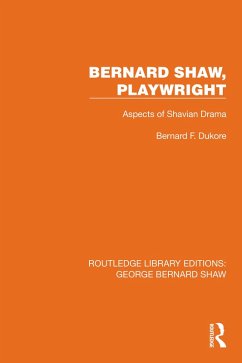Originally published in 1973, Dukore discusses the theory of drama that is the basis of Shaw's comedies, which present his views of mores and follies. That Shaw's theory was coherent and comprehensive Dukore shows in Part One of this book, with supportive references to Shaw's critical works, letters, speeches, and plays.
In Part Two, using such familiar works as Candida, Pygmalion, and Back to Methuselah as well as less-known plays like "In Good King Charles's Golden Days" to reinforce his points, Dukore analyses the discussion play - according to Shaw, the watershed of the "new drama." Androcles and the Lion and Saint Joan, along with other plays, illustrate Shaw's use of the prologue or prologuelike first act to create the play's social and psychological foundations. Man and Superman and The Apple Cart are among those which exemplify the play whose frame is both detachable from its centerpiece and also functionally integrated with it. Dukore also considers at length Shaw's reworking of other men's plays - Shakespeare's Cymbeline and Trebitsch's Frau Gittas Sühne - as well as his own Major Barbara. These revisions bring into sharp focus Shaw's perception of human nature and his principles of dramaturgy.
Among others of Shaw's plays, Dukore presents Too True To Be Good and Heartbreak House as examples of his protoexistentialism - his apprehension of the absurd and the existential as forces in life. Throughout Shaw's plays - major and minor - Dukore sees the influence of the playwright's socialism and supports this observation with precise examples from the works.
In sum, Dukore proposes fresh perspectives from which to regard Shaw's works for the theatre - works that were arrestingly relevant and immediate to the time.
Dieser Download kann aus rechtlichen Gründen nur mit Rechnungsadresse in A, B, BG, CY, CZ, D, DK, EW, E, FIN, F, GR, HR, H, IRL, I, LT, L, LR, M, NL, PL, P, R, S, SLO, SK ausgeliefert werden.


